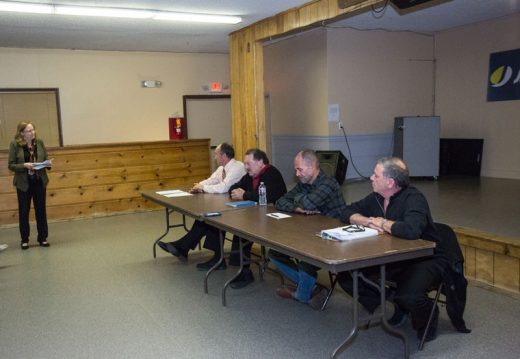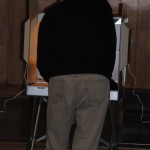
The Idyllwild Water District lost two of its five directors in September. Former President James Billman and Director Mike Freitas resigned unexpectedly within the same week.
The remaining directors have not been able to appoint replacements because Vice President John Cook prefers to wait and hold an election in March 2017. Regardless of the victors, the newly elected directors would have to stand for re-election again in August 2017.
California Government Code section 1780, subdivision (f)(1), authorizes a county’s board of supervisors to appoint replacements after 60 days of the resignations.
Four individuals — Geoffrey Caine, David Hunt, Dr. Charles “Chip” Schelly and Vic Sirkin — have decisively and publicly expressed their interest in serving on the IWD board.
Whether IWD ultimately holds an election or the supervisors choose the replacements, the Town Crier organized a forum for these individuals to speak to the district residents. The forum was Thursday, Nov. 10.
Part 1 of the forum’s questions and answers was in the Nov. 17 issue and Part 2 was in the Nov. 24 issue. Below are the remaining questions posed to the candidates and their responses.
Q. Cal Fire identifies water availability through hydrants on the rim of Idyllwild as limited. Given that IWD has the fewest steamer hydrants and lowest water fire flow per resident on the mountain, will you upgrade lines and hydrants on the rim?
CS: I have been a volunteer fireman at IFPD. I know several places on the Hill where [water] pressure is inadequate. I don’t think the fire department did the test, but after several years, we definitely need to upgrade several lines.
DH: I’m in favor of upgrading the lines.
VS. This really speaks to the quality of the general manager we hire to address this issue.
Q. Are you for “No growth?”
CS: I’m for limited growth. I like to support new people.
GC: It’s the nature of a small town. I would oppose high rises, but no growth is stagnation. I will prefer limited growth.
DH: General population, yes. We can’t generate changes. That’s why Idyllwild is a unique community.
VS: No. If 15,000 people want to have resources to build, our board shouldn’t control growth. We will sell water if we have it. What is the status of our water supply is what we need to know.
Q. Of these five actions, which is the most critical for IWD and which is the least?
1. Hire a new manager
2. Replace the water lines
3. Repair existing wells
4. Issue new water meters for additional revenue
5. Drill new wells
DH: Hiring a manager is number one for me. That will get the whole operation going. Number two is maintenance of wells and third would be water line replacement if old lines rupture.
GC: Hiring a manager is first priority. Then the manager works with the board to determine the priority of the other issues.
VS: Hire a manager is clearly important. Then replace old water lines. We can’t sell water without substantiation of its availability.
CS: I disagree with Geoffrey. The board, not the manager, develops the priorities. Board has to have consensus to tell manager.
GC: Board give priority to manager who can work with board. The ultimate responsibility for the decisions is the members.
Q. Would you limit public discussion at the monthly IWD public meetings?
CS: I go for transparency at the meeting. It’s the public’s meeting, not the board’s meeting.
The public comes to listen and learn, which is good. But they also come to tell the board what they need and want. We can’t do everything, but we should listen to the comments and try to meet them.
VS: Personally offended by the current 4-minute limit. If a person is going on and on ad nauseam, then certain limits are needed to keep them from going off the road. But most people are offering something we can learn from.
Q. Do you believe the owner of a parcel of land in the district is entitled to have water supplied to their lot, even if they do not build a house?
VS: Sure they should, if the water is available and if a study says there’s adequate water resources for IWD. Without a meter, they can’t sell the property unless they have a meter. Then it’s a valuable investment.
GC: I’m on a learning curve. I need to study the issue and find out how much water we have. It’s much more complex. In principle, they are entitled to water unless there is a limited reserve. A policy can set some priorities. Not everybody is entitled until we know how much water we’re getting.
CS: Six or seven meters sold each year wouldn’t use a lot of water. If we look at presentations, we haven’t seen anything saying we don’t have enough water. I don’t see issuing meters as a dangerous policy.
DH: Depends on the supply of water, which we need to research.
Q. How do you intend to fix the breach in trust between IWD and its customers and adjacent districts?
DH: Transparency is important. The first step is more meetings and give the community opportunities to talk. Then we need to get out in the community. It will take a long time to re-earn their trust. Nobody trusts the members, but the district should be the defender of the people.
GC: Step one is the board of directors work together. Even if they disagree, they should do it in the public eye. It will be a struggle in the beginning. Once the board begins to deal together, you begin to gain trust.
CS: Something very conducive for our community. I don’t think trust in IWD is completely lost, but dangerously close. It can be done quickly if the board is willing to be very transparent.
VS: If we operate in the public eye, smooth transition.
Q. For which other organizations have you worked for or donated time?
CS: I’ve been a member of the school site council, an IFPD volunteer, the Boy Scouts and the Idyllwild Community Fund.
GC: With my wife, we founded the charter high school here. I’ve been a past vice president and president of the Chamber of Commerce. And I’m regularly at every restaurant in town.
DH: I’m a member of the County Service Area 36 Advisory Committee, Camp Easter Seals, and advisory councils in Hemet and San Jacinto.
VS: I’ve been a member of the Chamber of Commerce, the Idyllwild Recreation Community Council, the HELP Center plays and Living Free.
Q. There were several questions soliciting their opinions about consolidating the three local water districts — Idyllwild, Fern Valley and Pine Cove.
CS: Now is just as good as a year from now. Like to do it through a combination of projects. The more we do together now means the more we can do together in the future.
GC: Love to do it. Perfect time is without general manager, but it’s not possible yet. I’d wait to see us amalgamate.
DH: I think a lot of legislation complicates the matter. It would be nice to work together, but consolidation will take an actual vote of residents.
VS: I think it’s doable. Wish it were doable today; not enough trust yet. IWD has money, Fern Valley has different government, and Pine Cove wants us to clean up our act, then it should be good.
Q. How can IWD balance the need for water conservation and environmental protection with legitimate concerns for responsible growth?
DH: We have to examine all of the wells, then maintain them and see if we have an ample supply. There won’t be high growth up here.
CS: Really hard because the board behind the learning curve. We need some time to do long-term planning. It’s very viable for the board to have two-year and four-year plans. A long-term plan will be very beneficial for the water district.
GC: It’s a mistake to put the board in the center. If the long-term environmental issues impact growth, then the residents need an open-ended and long community conversation.
VS: Any board, particularly our board, needs to be educated. The board needs to be prepared. It’s time to evaluate and question where we’re at. If there is no water, changes this. If we have water, then fine.










